constituent assembly of india debates (proceedings)- volume vii
constituent assembly of india debates (proceedings)- volume vii
constituent assembly of india debates (proceedings)- volume vii
You also want an ePaper? Increase the reach of your titles
YUMPU automatically turns print PDFs into web optimized ePapers that Google loves.
cannot provide enough labour for terracing work. Attempts have however been made to introduce<br />
terracing and improved methods <strong>of</strong> cultivation as well as the growing <strong>of</strong> fruits, and there is little doubt<br />
that good progress will soon be feasible in these directions. A certain amount <strong>of</strong> political consciousness<br />
has also developed among the tribes, and we were much impressed by the demand <strong>of</strong> the Abor in the<br />
Sadiya Frontier Tract for representation in the provincial legislature. The idea <strong>of</strong> Government by the<br />
people through their chosen representatives is not a totally new conception to most <strong>of</strong> the hill people<br />
whose ways <strong>of</strong> life Centre around the tribal and village councils, and what is required now is really an<br />
understanding <strong>of</strong> the mechanism and implications as well as the responsibilities <strong>of</strong> the higher stages <strong>of</strong><br />
administration and the impracticability as well as the undesirable results <strong>of</strong> small groups <strong>of</strong> rural<br />
population being entrusted with too much responsibility. Generally speaking, it can be stated that all the<br />
excluded areas <strong>of</strong> the province, not taking into account at this stage the frontier and tribal areas, have<br />
reached the stage <strong>of</strong> development when they can exercise their votes as intelligently as the people <strong>of</strong> the<br />
plains. On the ground <strong>of</strong> inability to understand or exercise the franchise therefore, there is absolutely no<br />
justification for keeping the excluded areas in that condition any longer.<br />
As regards the Frontier Tracts, not only has there been little education except in the fringes or plains<br />
portions, but administration has yet to be fully established over large tracts and the tribes freed from<br />
feuds or raids among themselves and from the encroachment and oppression <strong>of</strong> Tibetan tax collectors.<br />
The removal <strong>of</strong> the trade blocks set up by these Tibetans on the Indian side <strong>of</strong> the MacMahon Line<br />
sometimes creates delicate situations. Thus the country is in many ways unripe for regular<br />
administration. Only when the new five-year programmer has made good headway will there be an<br />
adequate improvement in the position. Even the village councils in these tracts appear to be illorganised<br />
and there seems to be little material as yet for local self-governing institutions though it may<br />
be possible to find a few people who can speak for their tribe. The plains portions are however on a<br />
different footing and the question <strong>of</strong> including them in the provincial administration needs careful<br />
examination. For example, we are <strong>of</strong> the view that prima facie there is little justification to keep the<br />
Saikhoaghat, the Sadiya plains portion and possibly portions <strong>of</strong> the BaliPara Frontier Tract under special<br />
administration.<br />
4. THE HILL PEOPLE'S VIEWS -<br />
Though the Constituent Assembly Secretariat and we ourselves, issued a leaflet to provide<br />
information and create interest in the political future <strong>of</strong> India, the Constituent Assembly's functions and<br />
the objects <strong>of</strong> our tour, the Hill people, even <strong>of</strong> the Excluded Areas, were not found lacking in political<br />
consciousness. Perhaps not without instigation by certain elements, this consciousness has even instilled<br />
ideas <strong>of</strong> an independent status the external relations under which would be governed by treaty or<br />
agreement only. In the Lushai Hills District the idea <strong>of</strong> the Superintendent who constituted himself the<br />
President <strong>of</strong> the "District Conference" which he himself had convened (see par. 5 Part II) was that the<br />
District should manage all affairs with the exception <strong>of</strong> defence in regard to which it should enter into an<br />
agreement with the Government <strong>of</strong> India A "Constitution" based on this principle was later drafted by the<br />
Conference. (The great majority <strong>of</strong> the Lushai however cannot be regarded as holding these views and it<br />
is doubtful if the District Conference represents the views <strong>of</strong> anybody other than certain <strong>of</strong>ficials and<br />
chiefs). In the Naga Hills, although the original resolution as passed by the Naga National Council at<br />
Wokha contemplated the administration <strong>of</strong> the area more or less like other parts <strong>of</strong> Assam, a demand<br />
was subsequently put forward for "an interim Government <strong>of</strong> the Naga people" under the protection <strong>of</strong> a<br />
benevolent "guardian power" who would provide funds for development and defence for a period <strong>of</strong>ten<br />
years after which the Naga people would decide what they would do with themselves. Here again it<br />
seems to us clear that the views <strong>of</strong> a small group <strong>of</strong> people, following the vogue in the Naga Hills <strong>of</strong><br />
decisions being taken by general agreement and not by majority-gained the acceptance <strong>of</strong> the National<br />
Council, for little more purpose than that <strong>of</strong> presenting a common front. In other areas more moderate<br />
views prevail. In the Garo Hills the draft constitution asked for all powers <strong>of</strong> government including<br />
taxation, administration <strong>of</strong> justice etc. to be vested in the legal council and the only link proposed with


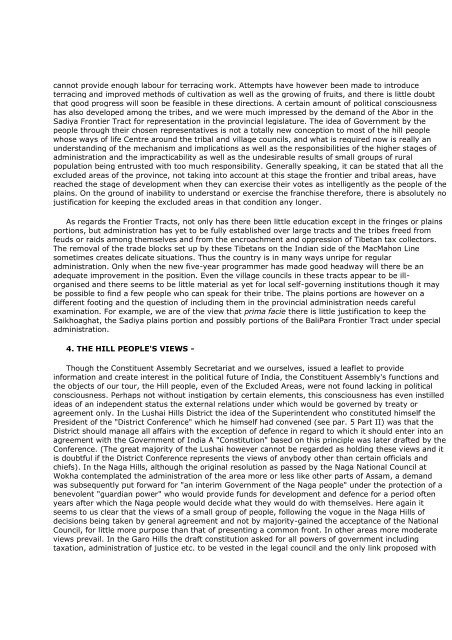
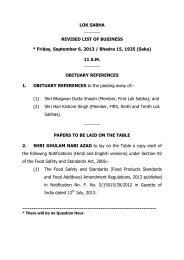
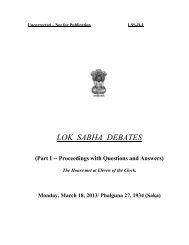
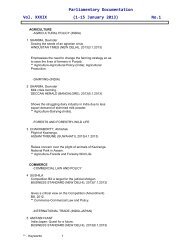
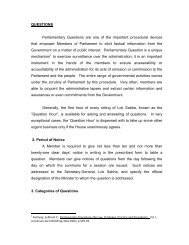
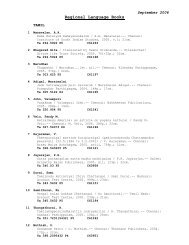
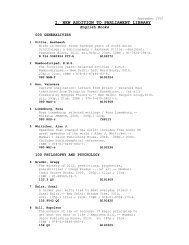
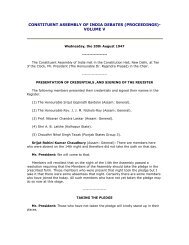
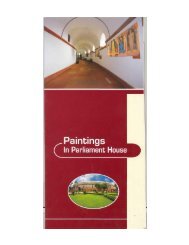
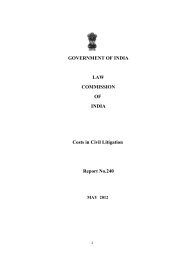
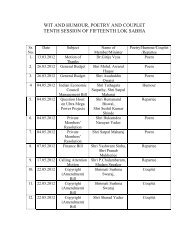
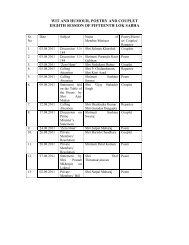

![gÉÉŌ A.]ÉŌ. xÉÉxÉÉ](https://img.yumpu.com/8015720/1/190x245/geeo-aeo-xeexee.jpg?quality=85)
